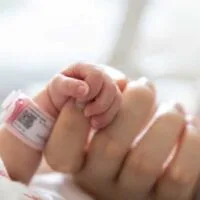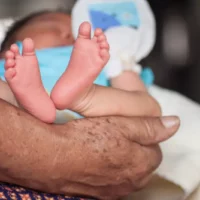There’s no denying the importance of grandparents in early childhood development. Passing on vital knowledge, wisdom, and love all contribute to a child’s overall wellbeing. Scientific research now shows, however, that a maternal grandmother plays a distinctly influential role. While we may think all cookies from grandma are created equal, genetics could be subtly influencing the impact these relationships have.

It’s All In The Genes
We all inherit genes from our parents, which are our basic units of heredity. These genes, in turn, are made up of DNA. DNA is then further broken up into separate pieces called chromosomes. Every human has a pair of 23 chromosomes, one from each of their parents, for a total of 46. Of these chromosomes, 22 will be identical, with the last pair of sex hormones differing depending on your gender. (1,2)
Half of a child’s DNA will be from the father, and half will be from the mother. That means that grandparents will share 25% of their DNA with the grandchild. Things change interestingly, though, when it comes to the maternal grandmother–and it has to do with the X-chromosome.
X and Y “sex” chromosomes are responsible for determining if you have male or female genitalia. Females have two copies of the X chromosome, while males have one X and one Y chromosome. Maternal grandmothers, therefore, pass on 25% of her X chromosomes to both her grandson and granddaughter. A paternal grandmother will pass on one of her X chromosomes to her granddaughter (making them 50% X-chromosome related) but won’t pass an X-chromosome on to her grandson. (2,3)
A Maternal Grandmother’s Contribution To Longevity
It’s simple to understand the science of genetics, but how does this influence the child? Where there are a few scientific theories, biologists suggest that closer genetic relations influence grandmothers’ behavior. This “Grandmother Hypothesis” proposes that post-menopausal women help their grandchildren to live longer lives, providing a genetic contribution to future generations. A team of researchers led by anthropologist Leslie Knapp discovered a genetic link to bolster this theory. (3)
The researchers evaluated birth and death records of seven major populations around the globe. Using data extending back to the 17th century, the researchers zeroed in on infant mortality rates and the presence of a maternal grandmother. Their results showed that the effect of a maternal grandmother’s presence in a child’s life was influenced by her genetic relationship to them. In laymen’s terms, it’s hypothesized that the degree a grandmother cares for a grandchild depends on the percentage of her DNA that child carries. (3, 4).
Since maternal grandmothers are more genetically related to their grandchildren than paternal grandmothers, they may be unconsciously prone to care more for their maternal grandchildren. Being closer-related logically influences how a person cares for a relative. We would expect a mother to care more for her own son than a nephew, or more for a sister than a cousin. Maternal grandmothers, sharing more genetics with their daughters and granddaughters, would thus tend to show more devoted care to those closely related. (4)
It’s true that grandparents, regardless of genetics, generally love and care for their grandchildren. This research only further validates that grandparents–specifically maternal grandmothers–have a valuable contribution to future generations. These theories explain why this genetic relationship may be so important. A happy child in the arms of their grandmother is usually all the evidence one needs to see the benefits.



